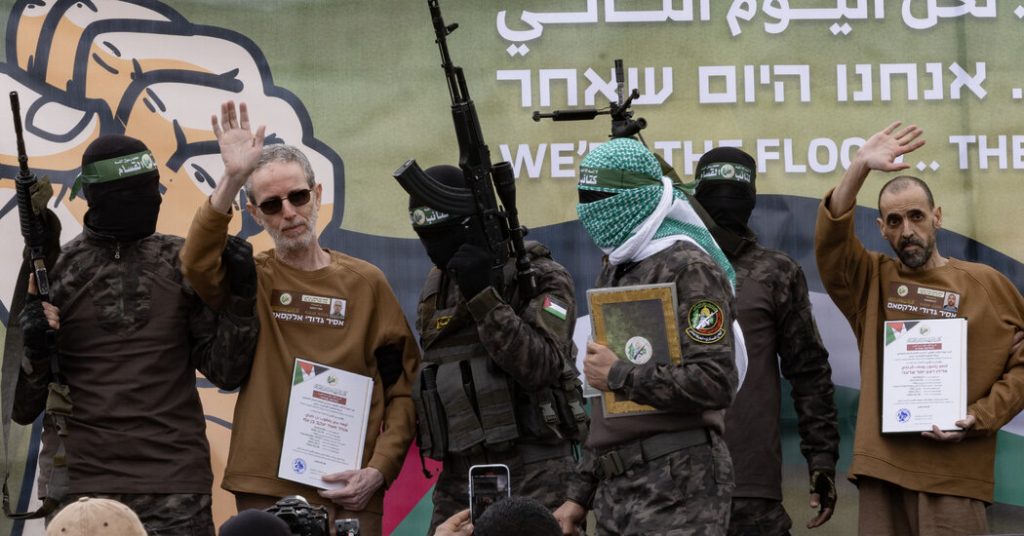The Harsh Reality of Captivity: Hostages in Gaza
The grim reality of hostages held in Gaza has come to light as three captives—Eli Sharabi, Or Levy, and Ohad Ben-Ami—were released on Saturday, October 7, as part of a cease-fire agreement between Israel and Hamas. Their emaciated appearance and the details of their captivity have shocked the world and raised urgent concerns about the treatment of those still being held. Relatives of the remaining hostages have warned of dire conditions, including starvation, physical abuse, and lack of medical care, which have left many captives suffering from severe physical and emotional trauma. The release of these hostages has brought temporary relief to their families, but the fate of others remains uncertain.
The three freed hostages were paraded at a ceremony in Deir al-Balah, Gaza, where they were forced to recite scripted thanks to their captors. The stark condition of the men—frail, painfully thin, and visibly traumatized—highlighted the brutal reality of their 16-month captivity. Medical officials have confirmed that two of the hostages were in poor health, with one described as being in a “severe nutritional state.” These findings align with accounts from other freed captives, who have spoken of starvation, intentional torture, and severe deprivation of basic necessities like water and sunlight.
The Cease-Fire Agreement and Its Challenges
Under the first phase of the cease-fire deal, Hamas agreed to release 25 living hostages and the remains of eight others killed in captivity, in exchange for the release of approximately 1,500 Palestinian prisoners. However, progress has been slow, with only about half of the agreed-upon exchanges carried out. The militant group has now indefinitely postponed the next round of hostage releases, initially scheduled for Saturday, accusing Israel of violating the cease-fire.
This delay has heightened concerns among the families of the remaining captives, who fear that any further postponement could result in the loss of lives. Relatives have emphasized the urgent need for the cease-fire to continue, citing the deteriorating health and conditions of the hostages. The fragile truce, already under strain, faces significant challenges as both sides accuse each other of violations.
The Denial of Basic Human Dignity
Hamas has claimed to treat its captives benevolently, but the testimonies of freed hostages and their families paint a far darker picture. Hostages have been held in tunnels, denied sunlight, and subjected to extreme physical and emotional abuse. Many have been bound for extended periods, and some have suffered severe injuries that have gone untreated.
The contrast between the treatment of hostages and Palestinian prisoners has also been highlighted by Hamas, which accused Israel of subjecting Palestinian detainees to torture, assault, and neglect. While these allegations have not been independently confirmed, they have added fuel to the already tense situation. The denial of basic human dignity—whether in Gaza or in Israeli prisons—underscores the broader humanitarian crisis at the heart of this conflict.
Personal Stories of Suffering and Loss
The personal stories of the hostages and their families humanize the grim statistics and provide a hopeful yet heartbreaking reminder of the human cost of this conflict. Idit Ohel, the mother of hostage Alon Ohel, described learning from military sources that her son was receiving minimal food and no medical care for multiple injuries, including an eye injury that has left him partially blinded. Alon, who was captured during the Hamas-led attack on the Nova Music Festival on October 7, 2023, has spent much of his 500 days in captivity bound and tortured.
Similarly, Sigi Cohen, the mother of hostage Eliya Cohen, recounted how her son, shot in the leg during the 2023 attack, has not received treatment for his injuries. Eliya, who was 26 when captured, has reportedly spent most of his nearly 500 days in captivity without sunlight and in constant physical restraint. These stories, shared by families through tearful news briefings and statements, reveal the immense suffering endured by the hostages and the unbearable anguish of their loved ones.
The Fragile State of the Cease-Fire
The fragile truce between Israel and Hamas appears to be fraying, with both sides accusing each other of violations. The postponement of the next hostage release and the deteriorating conditions of the captives have added urgency to calls for the cease-fire to continue. Ofer Calderon, a hostage released earlier this month, described his own harrowing experience of being held in tunnels without sunlight, subjected to severe hunger, and denied basic care.
Calderon’s account aligns with those of other freed hostages, who have reported a severe deterioration in their conditions following the initial phase of the cease-fire. He has urged world leaders to continue the deal, warning that any delay could cost lives and emphasizing that Hamas will not hesitate to harm the hostages left behind. The testimonies of freed captives serve as a stark reminder of the peril faced by those still in captivity and the need for immediate action to secure their release.
A Call to Action: Ensuring the Safe Return of All Hostages
The stories of the hostages and their families have resonated deeply, sparking widespread calls for urgent action to secure the safe return of all captives. Dr. Hagai Levine, who leads the medical team for the Hostage Family Forum, has described the hostages as having been subjected to “deliberate starvation” and “severe physical and emotional abuse.” Many have returned home with infections and emotional scars that will take years to heal.
The families of the hostages, supported by medical professionals and advocates, are pleading for the international community to intervene and ensure the continuation of the cease-fire deal. As each day passes, the lives of the captives hang in the balance. The world cannot afford to turn away from their plight. The release of all hostages is not only a moral imperative but a matter of urgent necessity. Any delay could mean the loss of precious lives, leaving families to endure the unbearable pain of losing loved ones to the brutal conditions of captivity.












